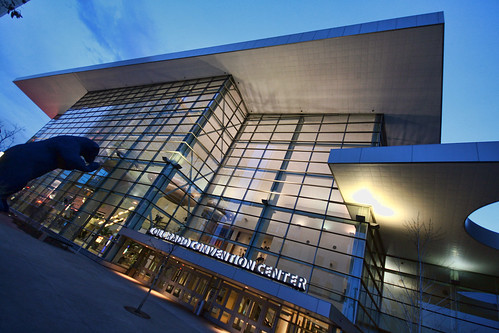 |
|
The Colorado Convention Center |
It’s one of the interesting, often regretful, and often delightful aspects of being an independent consultant (free-agent educator) that weekends have very little meaning. I am often traveling on Saturday or Sunday, sometimes presenting, or working in my office at least part of those days. At the same time, there are often other days of the week that feel like weekends. I have spent the last two days either presenting to education leaders or to classroom teachers, or driving to or from Williamsburg or Berkeley County, West Virginia. Today is wide open. Even though I still have a few hours of driving home, having made it as far as Roanoke yesterday, it feels so much like Saturday that I’m almost expecting to spend the morning watching cartoons. I’d love to get home before 8:00 to watch Mighty Mouse and Sky King.
It will be a day off, but also a day of preparing for my trip to Denver and almost a week at ISTE 2010. It’s our first International Society for Technology in Education conference that’s not a NECC, and I have to confess that it’s left a bit of a hole in our conversations about the event. But it won’t take anything away from the experience, I’m sure.
My calendar is more than full with most of the time slots in my planner sporting the yellow exclamation warning of overflow — conflicts. There are lots of highlights, including EduBloggerCon, TEDxDenverED, and ISTE’s theme of excellence exploration on Sunday afternoon — plus much more.
I’ll be delivering two formal presentations, one as a spotlight address (Cracking the ‘Native’ Information Experience) and the other as a thirty-minute general address (Patron 2.0: The ‘Natives’ are Restless) for the Media Specialists SIG gathering. In both of these presentations I will map out some of the important qualities of our students ‘native’ (outside-the-classroom) information experiences with their social networks, video games, and their hyper-connectedness, and suggest some ways that those qualities might be integrated into our classrooms, libraries, and school culture.
It occured to me this morning that I am suggesting a unique choice for us.
Will we benefit more from fitting video games and social networks into our curriculum — our methods and pedagogies?…
or
Do might we benefit more by expanding curriculum, methods, and pedagogies to encompass and harness the truly unique qualities of the millennial information experience?

I think that it would be more advantageous to input 21st century technologies into the methods and pedagogy of teaching. At this point, we are all well aware that technology and the internet are things that are becoming as commonplace as sliced bread. And if you are old enough, you remember that bread did not always come pre-sliced. Therefore, incoming teachers will know the type of educational system they are stepping into. Adding technology tools to the methodology of teaching would also help teachers to understand that social networking is ever expanding and gaining momentum. This is something to be taken seriously in our profession if we are to truly say we are training and uplifting the future of our nation.
I’m afraid that I have to respectfully disagree with you, Tara — though only in degree. I think that education must include “21st century technologies.” Even though we can teach and our students can learn with out it — I do not think that they can be prepared for their future, unless they are learning with and within the context of contemporary information and the technologies that drive it.
What I am after here has more to do with how we use the technology than the tech itself. What interests me, especially in terms of the work and living environments that our students will prefer and probably invent, is how they use contemporary technology. What are the qualities of that experience. I go to conferences where people become excited about bringing video games and social networks into the classroom — that this will “save education.” I think that we have to avoid believing that it is the technology that is driving living, working, and learning today. It is the information and the information experience. Can’t do it without the tech, but tech shouldn’t be our focus.
Thanks for continuing the conversation…
David,
Wow, a great debate that I think will also be heard in the halls of ISTE. Are you presenting your side of the issue anywhere at ISTE? We have many other bloggers attending our Tweet-up during ISTE, will you be able to make it? I think you would be perfect for our smackdown session!!
Monique (@compasslearning)
Monique, I’ve seen so many invitations (evites) for ISTE 2010 that it’s a buzz. Would you remind me/us of when and where yours is?
I have been struggling with this issue for a while now myself. Do I chase after the “Technology” and incorporate the “Bells and Whistles” into my classroom or do I emphasize what the emerging technology and information landscape holds for all of us and our learning. I do like the tools of technology and I have to admit that my students, and myself, do become excited by some of it all. However I have come to believe that the emphasis must be more about how we can use this all to learn and to share. We simply must adapt to the changing landscape, we can not teach the way we used to, but we must never forget that the goal is to put tools in the hands of students and help them use those tools to guide their own learning. I will be at ISTE hopefully learning for myself and having some ideas to share with my new students in the fall.